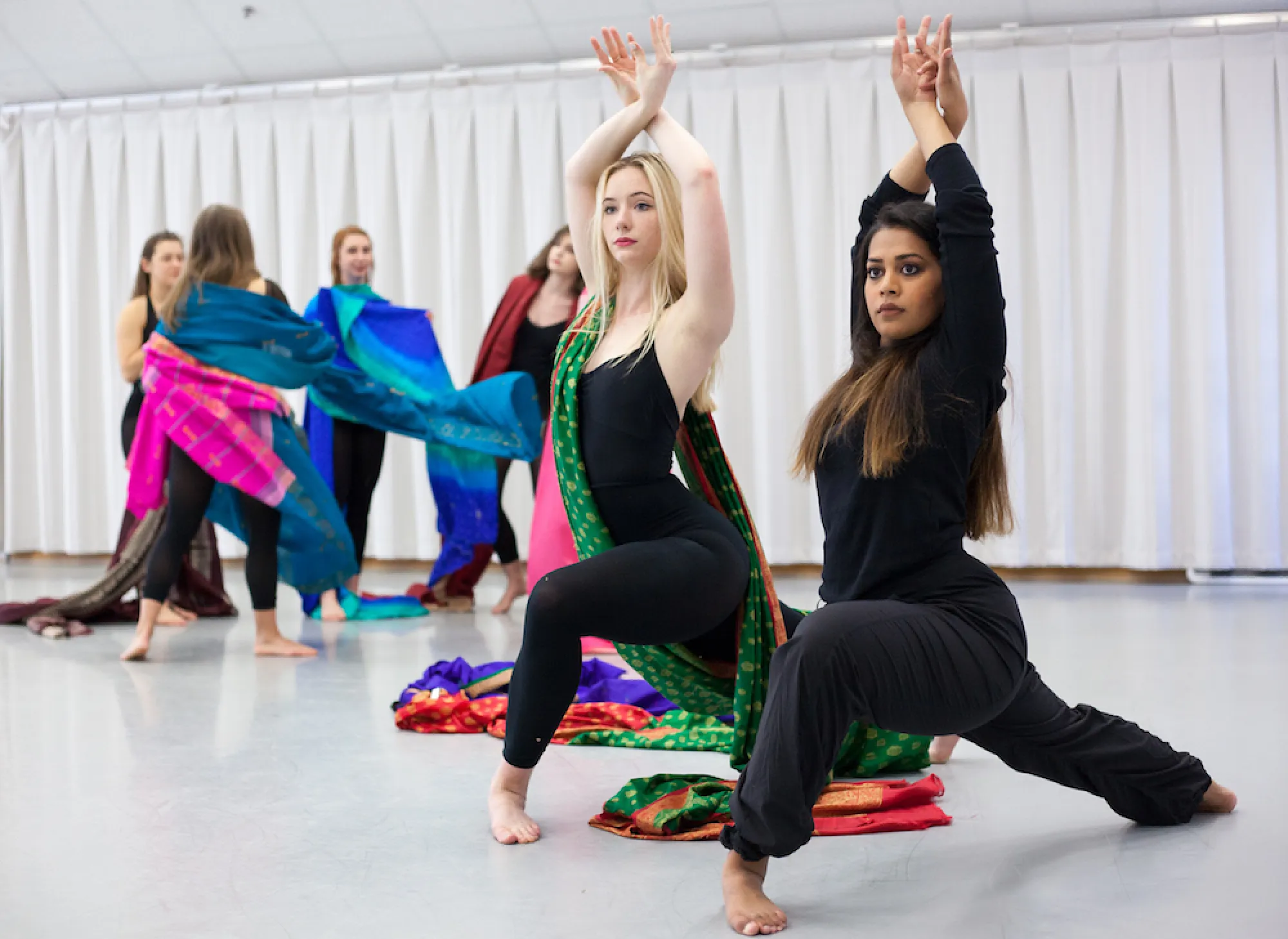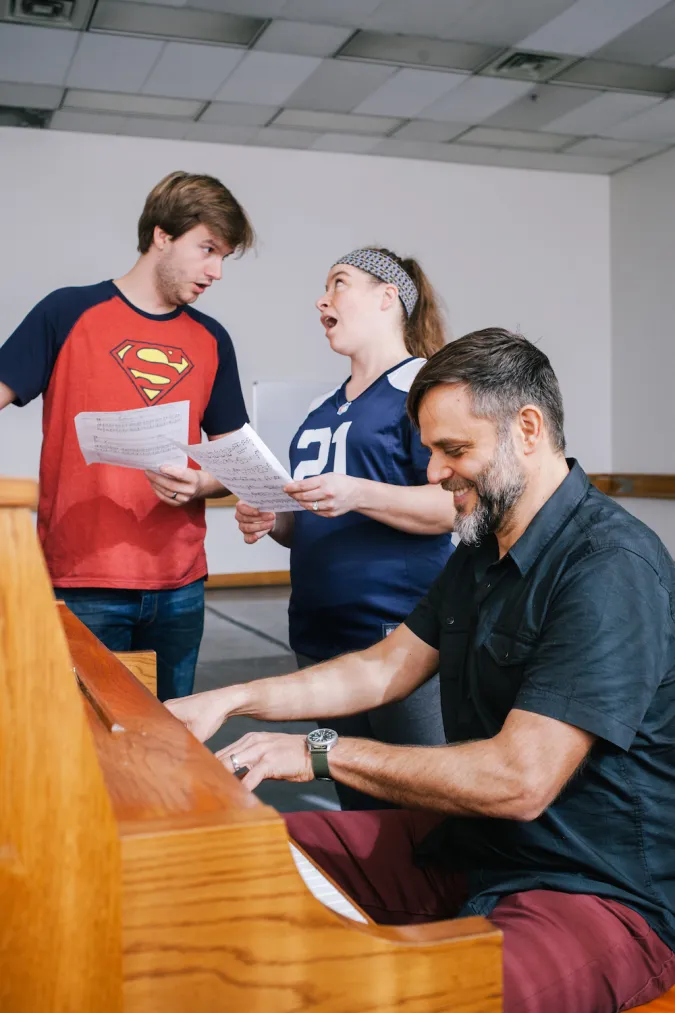Defining what is new

For one week, every other year, the Department of Theatre and Dance pauses, as the Cohen New Works Festival transforms nearly every imaginable space in the Winship Drama Building to host exhibitions of art. Students, faculty and the public wander throughout, taking in new work of all shapes and sizes—performance, opera, visual arts, acting, singing and multi-disciplined collaborations.
“It’s an immersive experience. You can show up and see something from 10 a.m. to 10 p.m.,” said Quetta Carpenter, a theatre lecturer serving as a faculty producer for her third festival. “The value of the festival is that it holds newness above all things.”
Created in 2001 and named in honor of the late faculty member David Mark Cohen, the festival boasts between 30 and 35 new works from students and draws about 7,000 attendees. Students submit applications to create any form of art, so long as it is new. A student committee selects participants, who receive $200 grants, mentorship and faculty support. But they are ultimately left to produce their own new work. Each work also is paired with a professional guest artist who attends the festival, giving students a contact beyond UT Austin
“The festival is giving young artists more skills about how to be self-sustaining after they leave school,” said Megan Tabaque, assistant producer and M.F.A. playwriting student.“Those skills include arts administration, arts leadership, technical skills and how to self-produce.”

Butler School of Music students Margaret Jumonville, an opera directing graduate student, and Michael Zapruder, a D.M.A. composition student, are teaming up with playwriting M.F.A. student Daria Miyeko Marinelli to produce Golden, a 30-minute mini-opera.
In the past, the festival has been open to anyone, but stayed largely a department-wide event. In 2015 and this year, producers pushed for more collaboration across disciplines, accepting more college-wide pieces than any other year. Students from across Fine Arts are participating and working with each other to create outside of the classroom.
“We want to blur the line between the audience and the performers,” Jumonville said. The orchestra—made up of the alumni-heavy new music ensemble Hear No Evil, will be included in the show, and the language is more colloquial than a standard opera.
Much of the action of the opera revolves around an object, so composer Zapruder is working with electronic music and motion-tracking technology.
“I’m here [at school] to experiment and do a lot of different things,” Zapruder said.
Even though Jumonville and Zapruder are both music students,it’s really the New Works Festival that provided the opportunity for them to work together.
“It’s much easier to write something when you know when and where you’re performing,” he said. “The festival has a built-in community. That motivates every artist. All we want is for our work to engage with other people.”
Carpenter said the theatre and dance department loves that the festival is expanding beyond its own students.
“Everybody’s creativity is improved by opening beyond just preaching to the choir,” she said. “It’s like traveling internationally.”
Of course, there is still a strong presence of those two disciplines. Sofia Aranha, third-year dance and economics major with a Texas Talent Scholarship, is using the festival to expand beyond the dance curriculum of the classroom. She’s exploring her own Indian heritage.
After years of dancing traditionally euro-centric styles such as ballet, Aranha arrived at college and began exploring her own cultural identity.
Her new work, Swadesh, creates a unique contemporary form that blends forms of the east and the west to explore intercultural performance and “cross-culturalism.”
“Cross-culturalism happens when individuals from one cultural background learn from another culture, and Swadesh will create a space for the audience to experience such a phenomenon,” she said. “I want a large cast to see how each dancer interprets a dance foreign to them.
“My work will create new avenues for conversation and critical inquiry not only about South Asian identity, but multiculturalism in dance as a whole,” she added.
Other standout works include Garbage of Eden, an interactive installation generated by waste engaging in environmental activism and community building, Structor, an interactive play in which the audience interacts with a computer program dialogue to create a character and then meets the character they create live, and The Festival Is Cock-A-Doodle-Now, a 9-foot wearable puppet mobile performance engaging festival attendees about the festival. “It’s all student-driven,” Jumonville said, describing what excites her most about the festival.
“It’s about creativity, the support for that creativity, the encouragement to push boundaries and really create things new that are relevant and a challenge for each of us. As individual artists it’s an amazing opportunity to grow.”
Who is David Mark Cohen?
David Mark Cohen is a former head of playwriting for UT Austin’s Department of Theatre and Dance. Cohen died in a car crash on Dec. 23, 1997, but during his life, he was an adamant supporter of new work. In his honor, and through the generous support of Broadway Bank, the Cohen New Works Festival continues to explore the endless possibilities of devised and collaborative new work.
Photo credits: Claire Goodman, left, and Sofia Aranha rehearse for Aranha’s piece, Swadesh, for the Cohen New Works Festival. Michael Zapruder, on piano, rehearses songs for his Cohen New Works Festival piece, Golden, with singers Andrew Breuninger and Ellie Shattles. Photos by Lawrence Peart.

